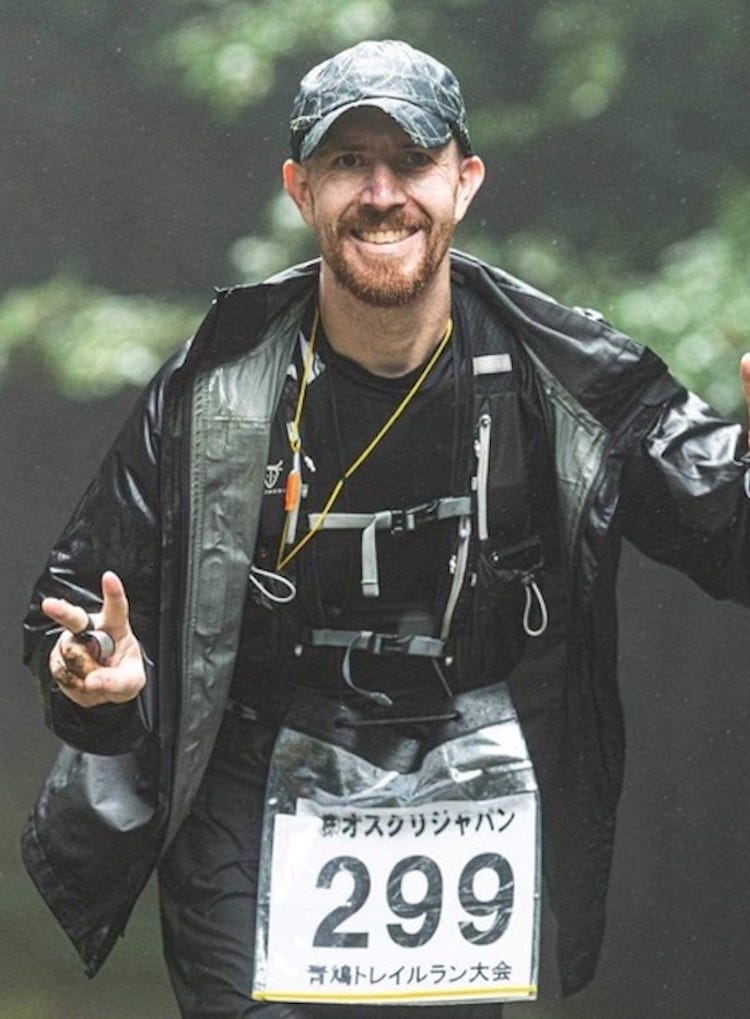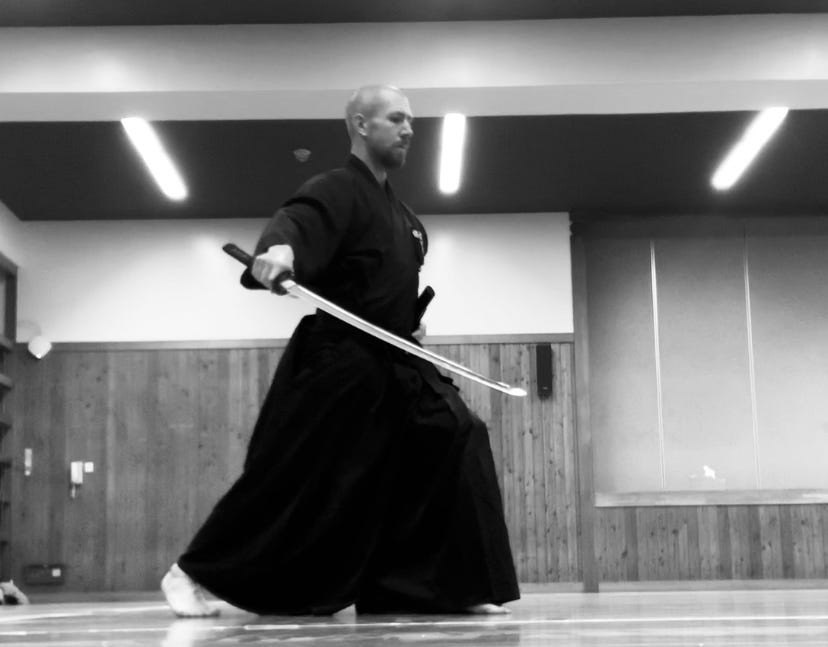Meet the ultra runner formed by injury and the Covid pandemic
Anthony Swain’s asthma had always prevented him running - until coronavirus forced him to embrace the sport
Anthony Swain never thought he would be a runner.
As a child he suffered from exercise induced asthma that left him struggling to breathe.
Yet, bizarrely, it was the impact of Covid-19, a virus which attacks the respiratory system, which saw Anthony take to running.
And not only that. He did it as the result of an injury.
Anthony, who lives in Japan and whose sporting life has been focused around martial arts - notably karate, turned to running when his dojo (a place of learning in martial arts) closed due to the pandemic and he began to struggle with back pain.
It was the beginning of a journey that has taken him to the starting line of a marathon - one he completed wearing a mask alongside just 26 other competitors - and beyond.
How Covid turned Anthony into a runner:
Anthony’s pre-Covid avoidance of running came as a result of his asthma, which caused his lungs to close up.
Despite struggling with breathing difficulties when doing any sustained cardio, he found he was able to take part in martial arts without any problems.
“When I ran, it just caused my lungs to mess up,” he told the Running Tales Podcast.
“But with the pandemic, my dojo closed down, so I wasn't able to do the training I usually did.”
Instead, Anthony started training at home, doing a lot of stretching routines and callisthenics.
But the pandemic also meant he was working from home and spending long hours sat at a desk.
It led to him having a spasm in his lower back that eventually began to press on his sciatic nerve meaning he couldn’t sit down without severe pain.
Willing to try anything, Anthony turned to the sport he thought he would never be able to do: running.
Shocked, he found he was no longer struggling with his breathing - and running had other immediate benefits.
The pain is his back quickly cleared up and he found as he ran he was losing weight and getting fitter.
He said: “Once I started running, I realised my lungs weren’t tightening up anymore.
“And then I suddenly started dropping lots and lots of weight. I ended up running and running and running.
“I just really enjoyed the experience of it and got hooked from there, especially because it went from being something I was almost scared of and not able to do, to getting over my asthma and being able to rediscover it and enjoy it.”
The lone pandemic runner:
Although the same level of restrictions people faced in places like Britain and America didn’t apply in Japan, Anthony still found his first year of running a necessarily lonely one.
“Japan never had any restrictions saying people couldn’t go out,” he said. “It was very much a request from the government not to go to places as much as possible.
“When we were going out, we were wearing masks.
“Most of the time that I was running, I was completely by myself. I didn't run socially at all.
“I did a lot of double runs where I'd be running once in the morning and once in the evening just to try and get my distance up.”
Wearing a mask while running was also something Anthony had to get used to, but which he took to with few issues.
The stigma and debate around mask wearing which existed in many western countries did not reach Japan, where even in the pre-pandemic days it has not been an uncommon practice.
Also on Running Tales:

“A lot of the reactions to women who have been harassed or killed outside is that they shouldn’t go out in the dark,” Dr Ashley Morgan
“That it is the dark that is the problem. And I think that obfuscates the issue, which is the problem is men who want to attack women…”
Click the headline above or here to read this story in full.
Anthony himself had regularly worn a mask during the colder winter months, particularly as doing so created a warm air filter that helped with his asthma.
Running with a mask became a habit, something as normal as pulling in his trainers or starting his watch at the beginning of a run.
And that didn’t change even when it came to taking on a marathon for the first time.
The marathon man in the mask:

Anthony found that the more he was running, the more he became drawn to test himself.
At that stage in his journey, the marathon seemed like the next logical challenge - but with coronavirus causing events to be opening and closing all the time, he had to act quickly.
“Within Japan, even though we didn't have lockdowns, we did have a lot of situations where all the events were cancelled,” he said.
“I wanted to get a marathon out of my system and because things were opening and closing all the time, I didn’t care how big the event was.
“It could have been just five people.”
What he found was a race in Yokohama, close to his home in Kanagawa. Located on a length of pathway close to a river, the small-scale marathon attracted a field of just 27 runners.
Despite the low-key nature of the event, Anthony was still struck by imposter syndrome as he lined-up alongside competitors who “looked really serious in their short shots and vests”.
The contrast was made more obvious as he had opted to wear a raincoat over his running kit to counter heavy rain that had arrived right on cue.
“I took a photograph and then they just set us off,” he said. “It was great fun but very daunting.
“Because there weren't many people, as soon as everybody set off, I didn't see anybody else for the rest of the race, almost until I crossed the finish line.”
Despite his fears, Anthony successfully completed the race, finishing in tenth place.
Throughout it he wore his mask, which he actually found helped him counter the cold and wet weather.
“I bought a sports mask and was able to breathe from under it a little bit more efficiently,” he said.
Ultra marathons, night vision and the fear of bears:


Having been bitten by the running bug, Anthony turned his attention to the next step on the ever-steeper ladder he found himself climbing.
Following the same procedure that had served him so well for the marathon, he entered the small-scale, 70km (43 mile) Michikusa ultra.
The event was focused on allowing people to finish and didn’t award prizes for the top three runners - or even give out medals to participants.
Anthony Swain posts stories about karate and running here on Substack. His page Bunburyoudou can be found here:
It did, however, come with night running, the fear of boars or bears, and some challenging terrain.
“It was the first time they ran the course and we ended up running in the middle of the night,” he said.
“The race started at 9pm and about 100 of 200 entrants dropped out due to Covid. So, the number of other runners was sparse and there were almost no volunteers.
“I was running around in the dark in a place I didn't know anything about, hoping I didn’t get mauled by a bear or anything.
“I had run at night a lot because it gets darker a lot quicker in Japan than it does in the UK, but never in the dead of night.
“It was a completely different kettle of fish because there was nobody around. Your circadian rhythm starts messing with you.
“You start thinking, ‘there's nobody else around - there are probably no bears out there, but I know they have wild boars around here’.
“I was very happy I could stick with some other runners because I would never have found my way out of the dark if it wasn't for them.”
Embracing ‘different flavours of pain’:
Anthony said his experiences in the world of running have helped develop him as a person - and to improve his martial arts.
He told Running Tales: “I don't think people really understand it unless they've experienced it, but there are different flavours of pain.
“If you are running really long distances, it hits you in a systemic way. Your legs start hurting, then you get fatigued through your entire body.
“When I say I've done martial arts, I do full contact karate. I'm used to getting people punching and kicking me full on.
“But that's a completely different feeling to running on your legs until they're in pain.
“Just being able to deal with these kind of different kinds of pain, it gets you used to dealing with things as they come along.
“Things in life might be annoying, but it's not as painful as getting my legs kicked in or running 70km.”
Running Tales on YouTube:
All of our podcasts in full, along with a host of shorter videos, can be found on our YouTube channel - including the story of two-time world mountain running champion, Grayson Murphy.
He added that the challenges he has faced running have been very transferable into everyday life.
“It helps with the stress you can deal with in life in terms of just enduring things for a very long period of time.
“When I ran that 70km ultra, I did it in about 10 hours. Within those 10 hours, I was able to knuckle down and just keep going.
“If I can deal with doing that for 10 hours, I can deal with doing something else that is monotonous or something I don't want to do for a long period of time.
“It really does get you used to grinding things out as you need to do them.”
With the Yokohama Marathon - a race on a much larger scale and with a medal on offer - recently added to his list of achievements, and a 110km (68 mile) ultra on his to do list, Anthony’s newly found running journey shows no signs of slowing down.
Not bad for someone who never expected to be a runner.
Thanks as ever for reading and listening to Running Tales. We couldn’t do this without your support - please back us to keep going by…







